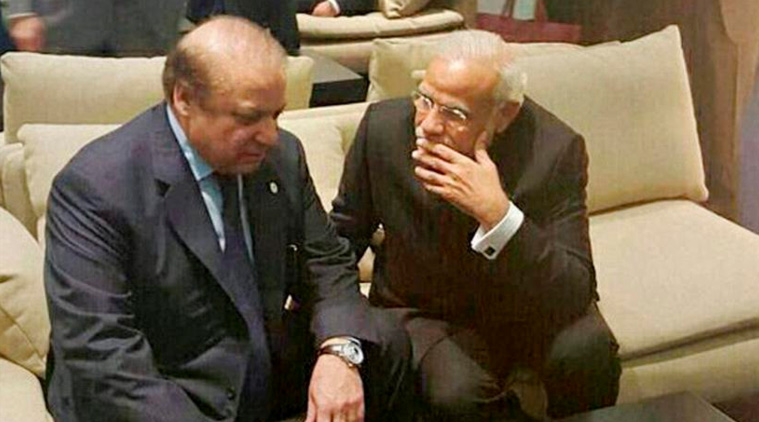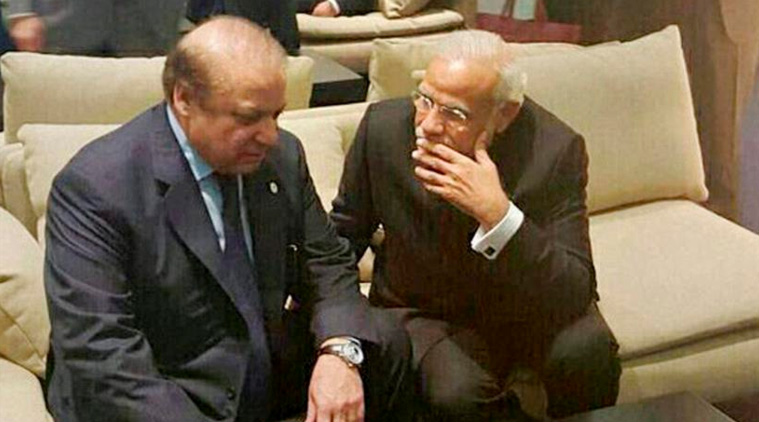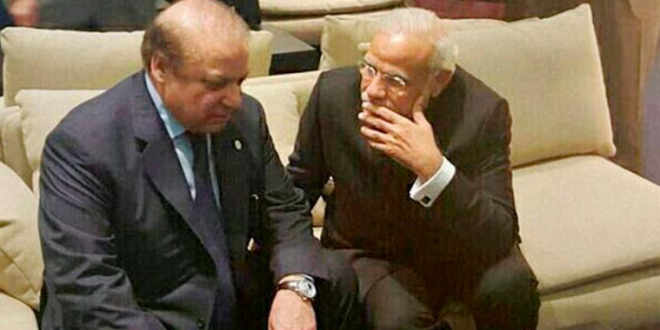
 PM Narendra Modi with Nawaz Sharif
PM Narendra Modi with Nawaz Sharif
In the present dispensation, a few non-official players close to the Sangh Parivar sometimes play a role in diplomatic developments. For instance, Prime Minister Narendra Modi’s cordial meeting with his Pakistani counterpart Nawaz Sharif on the sidelines of the climate change meet in Paris marked a thaw after several months of a frosty relationship. A week before the meeting, The Art of Living guru Sri Sri Ravi Shankar had met Pakistani High Commissioner Abdul Basit. Sri Sri has an impressive following among Pakistan’s elite and he, in his own way, has been trying to improve relations between the two countries. Recently, Nepal’s Foreign Minister and Deputy PM Kamal Thapa flew to Bangalore to meet Sri Sri. He later met Foreign Minister Sushma Swaraj in Delhi. It is noticeable that since then there has been a toning down of the angry rhetoric between the two countries.
Rahul heckled
Recently Rahul Gandhi was entering a tony restaurant in Delhi’s upscale Khan Market with a friend when he was surrounded by a group of rowdy youngsters, who heckled him. Rahul’s SPG had to intervene and rescue him from the crowd.
Elusive post
In his just released book On My Terms, Sharad Pawar discloses that he was in contention to be prime minister not once but twice. The first time was after Rajiv Gandhi’s death, when he and P V Narasimha Rao were in competition for the top job. 10 Janpath backed Rao because the self-styled loyalists of the Gandhi family warned that Pawar’s elevation would harm the First Family’s interests in view of his young age. They convinced Sonia Gandhi that Rao was a safer bet. The other instance Pawar writes about is of 1997, when the Congress was the largest group in Parliament but not in a majority. Sitaram Kesari as Congress party president had played a key role in installing H D Deve Gowda of the United Front as PM. However, shortly afterwards, writes Pawar, Kesari, bypassing the internal consensus within the Congress, pulled the plug on the Gowda government. He acted unilaterally since he aspired for the post himself. Kesari’s action evoked sharp reaction within the party and many leaders and MPs, including Margaret Alva and C K Jaffer Sharief, insisted that Pawar stake a claim to prime ministership by displacing Kesari as fast as possible, the NCP leader says. The functionaries were confident of a positive response from President K R Narayanan. Despite mounting pressure from MPs, Pawar says, he chose to keep quiet because he feared his move would split the Congress. Perhaps he also wondered whether the Gandhi family, always suspicious of him, would back him.
Arrow bows out
The JD(U) is holding a national executive meet in Delhi this Sunday, which will be attended by Bihar Chief Minister Nitish Kumar. A key issue to be discussed is the need to change the JD(U)’s election symbol, which is an arrow pointing horizontally. The symbol is very often confused with those of the Shiv Sena and JMM — both an arrow pointing vertically. In fact, the JD(U) believes it lost seven seats in the recent Assembly elections because of confusion over its symbol, with its rivals fielding “vote katuwa” candidates with vertical arrow symbols. Ideally, the JD(U) would like to get back the historical election symbols of the Janata Party and the Janata Dal. But the Janata Party symbol, of a farmer with a plough, was taken over by Subramanian Swamy and has been frozen ever since Swamy joined the BJP. The other symbol, of a wheel, was appropriated by H D Deve Gowda of the JD(S), who has reserved it though he has opted for a symbol of a farmer with a load on his head. Gowda is in no mood to part with the wheel symbol because his party is in the opposite camp from the JD(U) in Kerala.
Petty politics
At Modi’s lunch for his Japanese counterpart Shinzo Abe this month, several former Indian ambassadors to Japan were invited, but not Deepa Wadhwa, who retired on November 30. The pointed omission was not the only snub that Wadhwa had to face. It is customary that when a head of state is visiting India, the retiring ambassadors to that country automatically get an extension for the duration of the visit, to ensure continuity. However, Foreign Secretary S Jaishankar did not adhere to convention. The visiting Japanese delegation was taken aback at the former ambassador’s total exclusion from Abe’s visit, since she had done much of the preparatory work for it. Wadhwa was a popular ambassador in Japan. The Emperor and Empress of Japan had broken protocol and honoured her by inviting her for lunch before her return to India.
![]()
Source: New feed






